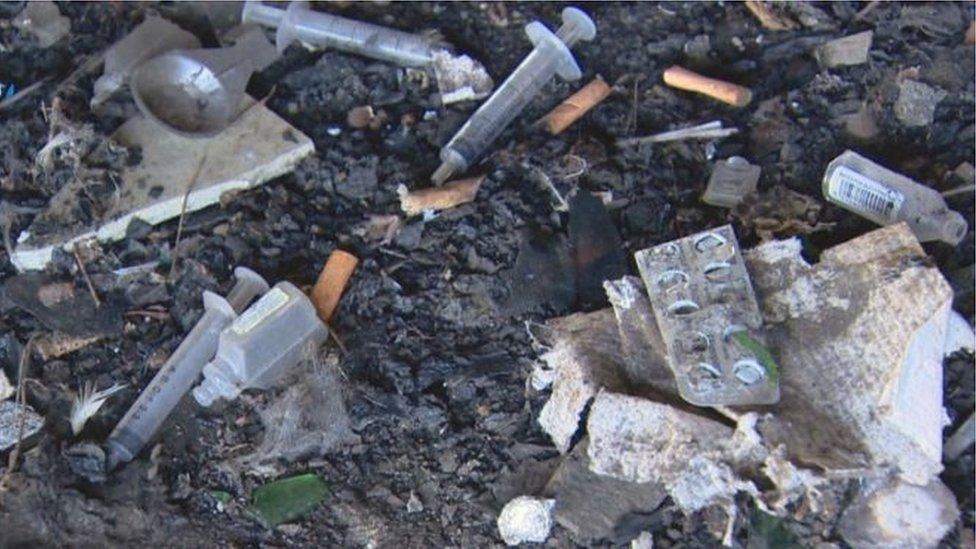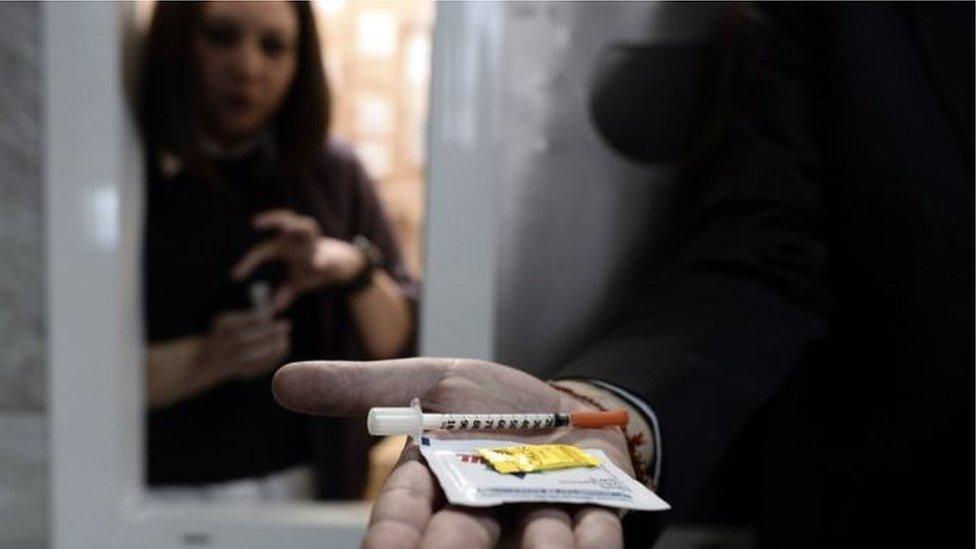Cocaine injecting and homelessness 'behind Glasgow HIV rise'
- Published

More than 100 new HIV cases were identified among drug users in Glasgow city centre between 2015 and 2017
A rise in cocaine injecting and homelessness are behind a 10-fold increase in HIV infection among drug users in Glasgow, research suggests.
The Glasgow city centre outbreak is the UK's largest in more than 30 years.
The study - conducted between 2011 and 2018 - involved almost 4,000 people who inject drugs in Greater Glasgow and Clyde.
More than 100 new cases of HIV were identified among drug users in the city between 2015 and 2017.
Before that, the number of new cases among drug users across Scotland had "remained stable" at about 15 a year.
Scientists at Glasgow Caledonian University (GCU) said a seven-year study showed increased injecting and homelessness were key factors in producing "a perfect HIV storm".
Dr Andrew McAuley, a senior research fellow in blood borne viruses at GCU, said there had been "a hugely significant increase in the prevalence of HIV infection in the population of people who inject drugs in Glasgow".
This was "largely driven by an outbreak of HIV first detected in 2015", he added.
Cocaine injecting was "one of the strongest drivers" behind the outbreak, and the phenomenon of cocaine injecting is "fairly new to Scotland", Dr McAuley explained.
Elsewhere in the world, drug users tend to inject crack cocaine. In Scotland, however, powder cocaine injecting is more prevalent.
He went on to say that "puts users at particular risk of blood borne virus transmission" because cocaine is a stimulant so users inject more frequently than they would inject heroin.
"With people who are injecting more frequently, their ability to access clean and sterile equipment for every injection is compromised so that certainly puts people at risk."

There have been calls for safe "fix rooms" to be set up
Dr McAuley also claimed the study, published in the Lancet HIV medical journal, supported those arguing for a safe drugs consumption room to be set up in Glasgow city centre.
He pointed to more than nine out of 10 people diagnosed with HIV now being successfully engaged in treatment.
Dr McAuley said: "The prevalence of HIV has been low and stable in this population since major outbreaks of HIV in the 1980s in Edinburgh and Dundee.
"However, the prevalence of HIV in Glasgow has increased 10-fold among people who inject drugs in the past seven years, from just 1% to over 10% in the city centre.
"The key drivers of infection are an increase in cocaine injecting, and homelessness.
"We also have a large population of people who inject in public places in Glasgow at a time when HIV has re-emerged.
"A combination of these factors has created a perfect storm for rapid transmission of HIV among people who inject drugs in Glasgow."
Heroin-assisted treatment
The research, carried out together with NHS Greater Glasgow and Clyde and the University of the West of Scotland, found the number of drug users with HIV went from one in 87 in 2011-12 to 25 out of 231 in 2017-18.
The proportion of users who were infected went up from from 1.1% to 10.8%.
The HIV outbreak in Glasgow occurred "despite the existence of a comprehensive harm reduction environment", the research found.
It highlighted that more than one million clean needles and syringes are distributed among drug injectors every year.
Dr McAuley said the research "provides further justification for interventions such as the proposed drug consumption room and heroin-assisted treatment services in Glasgow".
He added: "Crucially, over 90% of the individuals diagnosed as part of the outbreak have been successfully engaged in HIV treatment as a result of the multidisciplinary response implemented by the health board."
Glasgow Health and Social Care Partnership (HSCP), which supports opening a "safe" injecting room, welcomed the findings of the study.
Susanne Millar, the body's chief officer for strategy and operations, said it provided "further credible evidence for looking beyond current methods for helping this very vulnerable group".
She added: "We anticipate opening a Heroin Assisted Treatment facility in Glasgow later this year which will benefit heroin users who inject cocaine also, one of the groups most at risk of HIV transmission."
The Scottish government's public health minister, Joe FitzPatrick, said: "We support Glasgow Health and Social Care Partnership's proposals to introduce a secure, medically supervised consumption facility.
"We must be willing to back innovative, evidence-based approaches that can make a real difference to people's lives."
He added that an expert group on drugs had been convened to examine what further changes "either in practice or in the law, could help save lives and reduce harm".